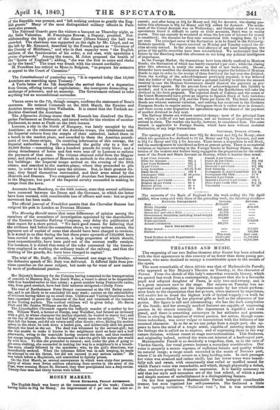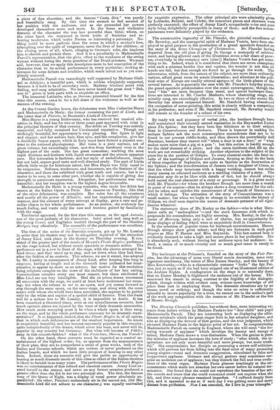THEATRES AND MUSIC.
The reopening of our two Italian theatres after Easter has been attended with the first appearance in this country of no fewer than three young per- formers, who seem destined to occupy a considerable space in the annals of the opera.
The most remarkable of these delats was that of Mademoiselle Parodi; who appeared at Her Majesty's Theatre on Tuesday, in the character of Norma. From the sketch of this lady's somewhat romantic history, which we quoted last week from a contemporary, it appears that she is a favourite pupil and adopted daughter of Pasta, is only two-and-twenty, and is in a great measure new to the stage. Her success on Tuesday was un- equivocal and complete; and the impression made by her whole perform- ance leads to the expectation that her powers, when matured by experience, will enable her to tread the highest walk of lyrical tragedy,—a walk for which she seems fitted by her physical gifts as well as the character of her genius. Her figure is tall and commanding; she has the dark complexion of the South; and her strongly marked features are capable of expressing passion in its utmost intensity. Her deportment is dignified and even grand, and there is something statuesque in her attitudes and gestures. Even in obeying the impulses of violent passion, her action, though some- times redundant, was never vulgar or inconsistent with the loftiness of her assumed character. In so far as we can judge from a single part, she ap- pears to have the mind of a tragic artist, capableof, entering deeply into the feelings she is called on to express, and of expressing them in the way- nature dictates, without resort to stage conventionalities. This freshness, and originality indeed, revived the worn-out interest of a hackneyed part.
Mademoiselle Parodi is so decidedly a tragedian, that, as in the case of Viardot-Garcia, her vocal powers become a secondary consideration. Her voice is properly a mezzo soprano, of sufficient fulness and quality within its natural range; a range much exceeded in the music of Norma's part, where C in alt frequently occurs as a long holding-note. In such passages her voice was strained and rather shrill; but her lower tones were beauti- fully soft and sweet, with occasionally that veiled or muffled sound for which Pasta's voice was remarkable, and which, though physically a defect, often conduces greatly to dramatic expression. It is hardly necessary to add that her style and execution are of the best school, of which a pure and simple manner of embellishment is a distinguishing feature. On her first appearance Mademoiselle Parodi betrayed considerable tremor, but soon regained her self-possession. She faultered a little in her opening recitative, " Sediziose voci "; but it was nevertheless a piece of fine elocution; and the famous "Caste diva" was purely and beautifully sung. By this time she seemed to feel assured of her position with the audience, and as she proceeded her powers developed themselves more and more. In the fierce and vindictive features of the character she was less powerful than Grisi; whom, on the other hand, she surpassed in those traits of feminine and re- lenting tenderness which make Norma so interesting a personage. No- thing could be more pathetic than the scene in which a mother's love, triumphing over the spirit of vengeance, saves the lives of her children; or the closing scene of all, where, clinging to Oroveso's robe, she implores him to cherish and protect them. And it is a peculiarity in Mademoiselle Parodi's representation, that she gives effect to the weakness of the erring woman without losing the stern grandeur of the Druid priestess. We must add, however, that we apply this description more to her conception of the character than to its actual performance in every particular; making al- lowance for some defects and crudities, which mark talent not as yet com- pletely matured.
Mademoiselle Parodi was exceedingly well supported by Madame Giuli- ani as Adalgisa- a beautiful part, which is seldom adequately supported, because it is held to be of secondary rank. Madame Giuliani acted with feeling, and sang admirably. We have never heard the great duet "Deli, con te" given in both parts with so exquisite an effect. The immortal Lablache, who, as Oroveso, presented himself for the first time this season, came in for a full share of the welcomes as well as the success of the evening.
At the Covent Garden house, the debutantes were Miss Catherine Hayes and Mademoiselle de Meric; the former sustaining the part of Linda, and the latter that of Pierotto, in Donizetti's Linda di Chantouni.
Miss Hayes is a young Irishwoman, who has received her musical edu- cation in Italy, and has for two or three years past appeared with eclat in the principal theatres of that country. Her debat on Tuesday was entirely successful, and fully sustained her Continental reputation. Though not strikingly beautiful, her appearance is very pleasing. Her figure is light and elegant; and her auburn hair, blue eyes, and fair complexion, give her a decidedly Saxon aspect, which in Italy must have formed a piquant con- trast to the national physiognomy. Her voice is a pure soprano, not of great volume, but exceedingly clear, and free from harshness even in the highest part of the scale. She has great execution; warbling the most rapid divisions and fioriture with liquid sweetness and the utmost apparent ease. Her intonation is faultless; and her style of embellishment, simple but not bald, argues good taste and well-directed study. The part of Linda affords little scope for histrionic talent, but Miss Hayes was fully equal to its exigencies. Softness, tenderness, and innocence, are the features of the character, and these she exhibited with great truth and nature; but it re- mains to be seen, in some other part, whether she is capable of giving due strength to passionate expression. Altogether, her performance was very beautiful; and her reception was in the highest degree favourable.
Mademoiselle De Merle is a young contralto, who made her &bat last season at the Italian Opera in Paris. Her success on Tuesday, like that of the other debutantes, was complete. Her voice has all the sweetness and nearly all the power of Alboni's ; and her unpretending simplicity of manner, and the absence of every attempt at display, gave a rare and pe- culiar charm to her whole performance. As an actress, she evidently has much feeling, and wants only the ease and freedom gamed by familiarity with the stage.
Tamburini appeared, for the first time this season, as the aged Antonio, one of the most pathetic of his characters. Salvi acted and sang well as the young Count; and Tagliafico bustled through the part of the libertine Marquis very effectively. The ensemble of the performance was excellent.



























 Previous page
Previous page